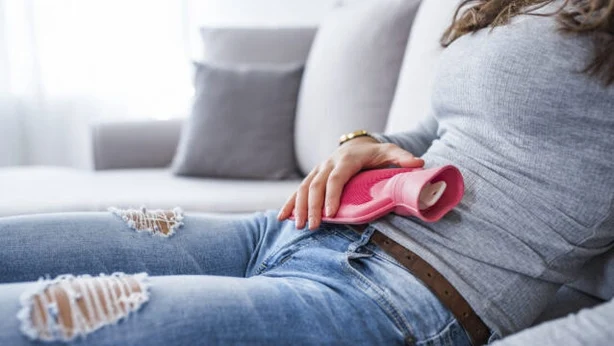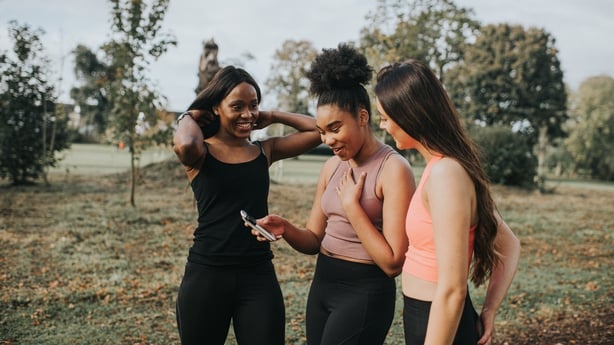When Orna Murray, an athlete, lost her period, she says she was initially "delighted".
"I was absolutely delighted that I didn't have a period because it was easier to train", she tells me. "That's how poor my understanding was of my own body."
Murray, a seasoned and accomplished runner at that point, had experienced amenorrhea – the stopping of menstruation, which can be caused by a number of factors from excessive exercise to low body weight – for a large part of her running career and says it was never flagged as an issue.
We need your consent to load this Instagram contentWe use Instagram to manage extra content that can set cookies on your device and collect data about your activity. Please review their details and accept them to load the content.Manage Preferences
She would mention it to her coach, her nutritionist and her physio "in passing", but it was longer before she realised what a risk it was to her health.
"I thought it was normal. I thought that if you were training hard, it was normal for you to lose your period."
It was one of the factors that led Murray and her sister Niamh to found Move2B, a female-focused sports psychology and physiology initiative. "There are so many young girls like me who just are totally ill-equipped to deal with their period. So when they don't have it, rather than it being a major red flag they're like oh my god, yay!"
A turning tide
The tide is turning when it comes to periods and sport. In 2022 the England women's football team aired their frustration at having to wear white shorts during matches, prompting a change to their kit in favour of dark blue shorts, while campaigners at Wimbledon protested the tournament's strict all-white dress code.
This, and more, continues to expose the paradox of an industry that trades off of peak performance and health, but largely neglects a significant factor in the physical wellbeing of 50 per cent of the playing population.
Women feeling alienated from sport is sadly nothing new in many regards. A 2021 study by Sport Ireland found that female participation in sport starts to plummet early, as just 7 per cent of girls aged 14 to 15 meet the recommended physical activity levels. This, it states, is down to anything from access to resources and clubs, to not considering themselves "sporty".
We need your consent to load this Instagram contentWe use Instagram to manage extra content that can set cookies on your device and collect data about your activity. Please review their details and accept them to load the content.Manage Preferences
Confused and scared
Menstruation, however, and the difficulties it can bring, is a considerable factor. Ciara O'Flynn, project lead of Anytime of the Month, a student-led social enterprise working to combat period stigma, says "anxiety surrounding menstruation" was the reason she dropped out of sport as a teen.
"Those white shorts were the death of me", she tells me. "I didn't have a hold on it and I was confused, I was scared. I went to an all-girls school and I was scared of that kind of environment. It's a bit of a paradox because you think, oh, all-girls school, a lot of community spirit around menstruation. And it was the exact opposite."
She says stigma still existed even among girls going through the same thing. "I loved secondary school, but I didn't learn a thing about my period and I didn't talk about it. I'd rather spend the day with toilet paper as a pad instead of asking one of my friends."
As a student playing sport, she recalls having to nip into the local Supermac's to use the bathroom because there were no changing rooms available for girls. "Fifteen girls are trying to share one bathroom in the local cafe, struggling with your period, or 'I don't know how to put a tampon in', or 'I don't have a pad'", she says.
"That not only affects your performance, but affects your mind as well."
The role of coaches, she says, is integral, while acknowledging that they "can't change the infrastructure". "I for one, know my own father. And if I was 16 and he was coaching me and I stood in front of him and I said, I have my period, I don't want to play, he'd almost get sick. We need to start educating our coaches."

A daunting task
Simon Devenney, a sports scientist, currently coaches senior athletes and mostly female ones, though he started off coaching juveniles. He says that when he was first starting out, there weren't as many resources for educating coaches about menstruation.
"Unless we were asking questions", he adds. "And I think at that stage, it's quite a daunting task, both from a female point of view in terms of approaching a male coach and vice versa. There's that kind of stigma that some people aren't comfortable with it whereas nowadays it's a lot more free and open.
"But it would have been a case that possibly may not be addressed until it was too late. Nowadays there's a lot more checking in on a regular basis."
One crucial reason for coaches to take menstruation into account is the threat of REDS, or Relative Energy Deficiency Syndrome. Once known as the female triad, before it was changed to be more inclusive, it happens when the body is not taking in enough energy to meet the demands placed on it by the amount of exercise being performed.

This leads to an increased risk of injury, stress fractures and more, and one of the main symptoms of it is an irregular or stopped period.
"We can generally see in terms of depending where they are with their cycles, whether they have good sessions, bad sessions or races", Devenney says. "We can try and tailor the race season around the cycle as well because a lot of times chatting to the girls, they don't find they perform well whether it's in training or races when at certain stages."
Without that, "we're kind of going into it very blind", Murray adds. "A lot of women just hope that they don't get their period on race day or on the day of the match.
"This is 50% of the population. It's not like it's a niche."
A physiological advantage
Rather than a hindrance, more healthcare professionals, coaches and women are recognising a healthy menstrual cycle as an advantage. "When you have a menstrual cycle, it's like your body giving you a big green tick", Murray says. "It just becomes a training marker and once people can see it in that way, it kind of loses all its weirdness."
The uniqueness of each woman's menstrual cycle is also one of the reasons there hasn't been as much research into the area as is needed, as Murray notes. One woman might be able to train on day two of her period, while another would need until day four, for example. "I think that's hard for the sports science community because they like to have definite answers."
In the gap between theory and practice, coaches can lead the way in normalising menstrual health awareness in sport. "I still think there needs to be more workshops, whether it's from governing bodies or healthcare professionals", Devenney says.

"We're improving over the last three or four years, but we're still probably three or four years behind in terms of where other nations and federations are."
"If one coach stands in a room with his 14 or 15 players and he says, 'girls, let's talk about menstruation, let's talk about your periods and how it's affecting you', that impact will be huge", O'Flynn adds, as well as solving the "physical needs" like changing rooms and providing period products.
"We can actually support women in a way that's easy, quite cheap and allows them to really get a lot more out of their sporting careers and a general enjoyment of sport and movement", Murray says.
"If you ask anybody in the sporting environment, that is what they want. They want people to enjoy themselves, to enjoy the sport and once they're aware that there are certain things stopping people from enjoying the sport they actually very quickly adopt those practises.
"I would be very surprised if in two or three years we're not having a very different conversation."
Disclaimer: The copyright of this article belongs to the original author. Reposting this article is solely for the purpose of information dissemination and does not constitute any investment advice. If there is any infringement, please contact us immediately. We will make corrections or deletions as necessary. Thank you.






